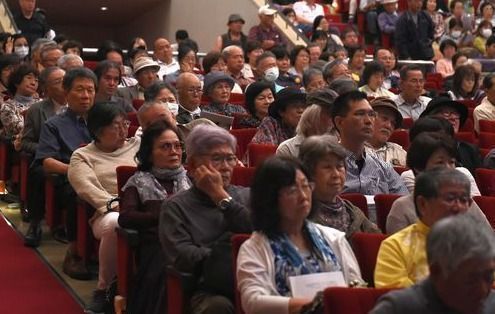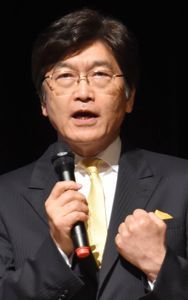71 years after the enactment of the Japanese constitution, assemblies take place all over Okinawa regarding the Article 9

A full house watching speakers at the “Constitution Lecture Series.” May 3, Ginowan, Okinawa
May 4, 2018 Ryukyu Shimpo
The “2018 Constitution Lecture Series” was held May 3, the anniversary of the enactment of the Japanese constitution, at Ginowan Community Center (hosted by The Okinawa Constitutional Association, the Okinawa Human Rights Association, and the Japan Scientists’ Association Okinawa Branch).
It has been almost one year since Prime Minister Abe Shinzo proposed an amendment to Article 9, which currently prevents Japan from establishing the capacity to wage war, which would re-define the role of the Japanese Self Defense Forces (JSDF).
In Okinawa, the plan to deploy JSDF to the Ryukyu Islands is progressing steadily. The speaker at the lecture talked about the importance of constitutionalism, while also telling the audience to think of how the current constitution has until now protected peace and human rights, urging everyone to maintain Article 9 in its current state.
All around the prefecture, there were similar assemblies, both those arguing to maintain the constitution, and those arguing to amend it.
At the Constitution Lecture Series, lawyer Makoto Ito, vice president of the Japanese Bar Federation’s constitutional issue policy bureau, which has been involved in things such as forming organizations with constitutional scholars opposing the authorization of force for collective self-defense, spoke about fundamental constitutional content and the problem with amending the constitution.
It said that revising Article 9 would become democratically valid via national vote, after which opposing things just as the deployment of the JSDF to the Ryukyu Islands, “would no longer be possible.” He warned that human rights have the potential to be suppressed in the interest of national defense and safety and that, “conscription is also a possible outcome.”
He continued that the constitution is what binds a people to its country, saying, “It is necessary to not wither, and to raise one’s voice and make the reality of the constitution close to that of its ideals.”
On Ishigaki Island, a representative from a citizen group fighting the deployment of JSDF to the island outlined the situation and activities taking place.
A lawyer also gave a performance of “Imitation Constitution Café,” which aimed to make the audience feel and care for the constitution.
Ito warns that in re-defining the role of the JSDF, “We lose the ability to renounce war.”

Constitutional Lawyer Makoto Ito explaining the important role of Article 9
In his keynote lecture, Makoto Ito explained that after World War 2, it was the existence of Article 9 that prevented Japan from getting wrapped up in wars with other countries, and stressed that in re-defining the role of the JSDF runs the risk of re-writing the function in Article 9 that allows Japan to renounce war.
Ito serves as the vice president of the Japanese Bar Federation’s constitutional issue policy bureau, and has been involved in lawsuits pertaining to the protection of citizen’s rights, including the “Vote-Value Disparity” lawsuit, which aimed to invalidate election results based on the idea that a vote in a smaller district had much more value than a vote in a larger one.
Ito explained an important role of the constitution, saying, “The constitution exists so that citizens can limit the power of the state. Even if we don’t care about the government or the constitution, we still have a relationship with it.”
In particular, he commented on the role of paragraph two of Article 9, saying, “It cuts off the path to waging war, by prohibiting the maintaining of a formal military.”
He raised the example of the U.S. pointing to a type of economic conscription where the poverty class is forced to join the military for economic reasons, and how soldiers returning from war experience Post-traumatic Stress Disorder (PTSD), stressing, “Whenever there is war, there is always a ‘Post-war.’ Changing Article 9 means inviting these kinds of risks.”
He indicated that the re-defining of the role of the JSDF as planned by parties such as the Liberal Democratic Party (LDP), “is the same as re-writing Article 9.” Indicating that, “new laws destroy the old ones,” he argued that even if Article 9 were to remain, there is the danger of adding articles to the constitution that would override it.
Furthermore, “the deterrent power an army possesses is also a power to provoke, making it a double-edged sword. It is necessary that the citizens of Japan remain cool-headed and be proactive.”
He said that problems such as the relocation of MCAS Futenma to Henoko were essentially the government forcing citizens to choose between “way of life” and “safety,” and that “we cannot allow being ‘forced to choose.’”
“It the responsibility of the government to provide us all with a way of life, safety, and community, as indicated in Article 13. We cannot allow people to be divided by asking them to choose one or the other.”
(English translation by T&CT and Sam Grieb)
Previous Article:Former Prime Minister Hatoyama calls for breaking away from U.S. obedience
Next Article:Okinawa’s distant islands face a grave situation as hazardous waste washing ashore from overseas threatens island ecosystems
[Similar Articles]
- Genichiro Takahashi emphasizes importance of Okinawan view of the constitution
- Editorial: Prime Minister Abe’s stance on constitutional amendments dangerously belittles the constitution
- Fight for human rights in Okinawa
- History book on human rights in Okinawa published
- International Human Rights Law Association holds Japan-Okinawa debate regarding UN review
 Webcam(Kokusai Street)
Webcam(Kokusai Street)


